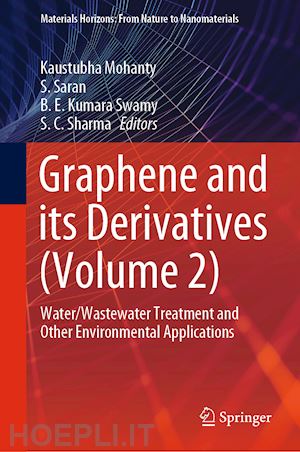
Questo prodotto usufruisce delle SPEDIZIONI GRATIS
selezionando l'opzione Corriere Veloce in fase di ordine.
Pagabile anche con Carta della cultura giovani e del merito, 18App Bonus Cultura e Carta del Docente
This book describes the essential characteristics of graphene, graphene oxide, reduced graphene oxide, and its nanocomposite and their applications in water and wastewater treatment and other environmental issues. The book introduces each topic in detail, discusses the basic principles, and analyzes and summarizes recent developments in the field. Various topics covered in this book include role of graphene as a potential material in photocatalytic organic pollutant degradation, water splitting applications, capacitive de-ionization techniques, air purification, gas adsorption, and decontamination of pathogenic microorganisms. Given the contents, the book is useful for students, researchers, and professionals working in the area environmental science and materials, especially graphene oxide, graphene, and graphene nanocomposite.
Prof. Kaustubha Mohanty has obtained his Ph.D. degree in Chemical Engineering from Indian Institute Technology Kharagpur and is currently working as Professor and Head of Chemical Engineering department at Indian Institute Technology Guwahati. He had two postdoctoral stints at Ben-Gurion University, Israel, and McMaster University, Canada. His key research areas are biofuels, biological wastewater treatment, membrane technology, microalgae biorefinery, and biomass pyrolysis. He has published more than 190 research papers in peer-reviewed journals and edited few books. He has developed an advanced microalgal biorefinery model that integrates wastewater treatment and high-value biofuel production. He has worked extensively on catalytic and non-catalytic pyrolysis of lignocellulosic biomass that had resulted in sustainable bio-oil production under the circular bioeconomy approach. He is Chief Editor of Journal of Chemistry; Associate Editor of The Journal of Institution of Engineers (India) Series: E; Associate Editor of Research Journal of Environmental Sciences; Editorial Board Member of Renewable Energy (Elsevier) and Biomass Conversion and Biorefinery (Springer). He is Fellow of Royal Society of Chemistry, UK, Fellow of Institution of Engineers (India), and Fellow of Indian Institute of Chemical Engineers. He is Recipient of Distinguished Alumni Award 2022 from RIT, Bangalore (Formerly MSRIT).
Dr. Saran has obtained his Ph.D. degree in Ecology and Environmental Sciences from Pondicherry University and is currently working as Assistant General Manager, Research and Development department at Good Earth Chemicals Pvt Ltd, Hospet, Karnataka. Previously, he was worked as Principal Project Associate at the NEERI in mercury remediation from contaminated soil project and Institutional Postdoctoral Fellow (IPDF) at Centre for the Environment, Indian Institute of Technology Guwahati, Assam, India, focused on green synthesis and characterization of metalnanocomposite for catalytic and photocatalytic applications. His key research areas are photocatalysis, catalysis, water and wastewater treatment, odor control chemicals, and waste management. Also, he has plenty of research experience in the physical, chemical, microbial, and heavy metal analysis of water, wastewater, soil, sediments, and ambient air quality monitoring and assessment. He has published more than 25 research papers in peer-reviewed journals. He has recently developed a cost-effective odor control chemical using by-product. Presently, his research work is on development of new chemicals for odor control and wastewater treatment applications.
Prof. B. E. Kumara Swamy has obtained his Ph.D. degree in Industrial Chemistry from Kuvempu University and Postdoctoral Research Associate from Southern Methodist University, Dallas, Texas, and University of Virginia, Virginia, USA. Presently, he is working as Professor of Industrial Chemistry at Department of Post-Graduate Studies in Industrial Chemistry, Kuvempu University. His research areas are development of electrochemical sensor for some neurotransmitters, biosensors, nanosensors, and nanochemistry. He has published more than 282 research papers in peer-reviewed journals. He is Associate Editor in Science Letters Journal, World Research Journal of Analytical Chemistry, Academic Editor in Journal of Chemistry, and Advisory Board Member in Biopublications and worked as Guest Editor in Special Issue on Nanoparticle and Cancer Treatment. He is Fellow of American Chemical Society, Life Member of Indian Society of Analytical Scientists, SAEST Member, and ICC Member. He served as Deputy Registrar in Development Section Kuvempu University from July 2015 to September 2020, Deputy Director in IQAC, Kuvempu University, and NAAC-DVV External Expert, Government of India. He is Recipient of Prof. M.R. Gajendraghad Gold Medal, Young Scientist Award from ICC and Swadeshi Science Congress, and Distinguished Scientist Award. Presently, he is Chairman in Board of Studies in Department of Industrial Chemistry, Kuvempu University, and Research and Development Special Officer to Vice Chancellor of Kuvempu University Shankaraghatta, Karnataka, India.
Prof. S. C. Sharma is an amalgamation of Eminent Academician, Researcher, and Proficient Administrator. He is Leading Scientist in the field of material science and engineering, nanoengineering and fracture mechanics. The intellectual footprints of Prof. Sharma are exemplified from more than 348 research articles and several books that he co-authored. His latest research work includes photoluminescence of nanophosphors, photoluminescence, thermoluminescence, photocatalytic studies of radioactive nanomaterials, sensors for phenolic compounds, hydroquinone, melamine, dopamine, paracetamol, folic acid, etc., display, dosimetry, and advanced forensic applications of nanomaterials. His research collaborations are withmore











Il sito utilizza cookie ed altri strumenti di tracciamento che raccolgono informazioni dal dispositivo dell’utente. Oltre ai cookie tecnici ed analitici aggregati, strettamente necessari per il funzionamento di questo sito web, previo consenso dell’utente possono essere installati cookie di profilazione e marketing e cookie dei social media. Cliccando su “Accetto tutti i cookie” saranno attivate tutte le categorie di cookie. Per accettare solo deterninate categorie di cookie, cliccare invece su “Impostazioni cookie”. Chiudendo il banner o continuando a navigare saranno installati solo cookie tecnici. Per maggiori dettagli, consultare la Cookie Policy.